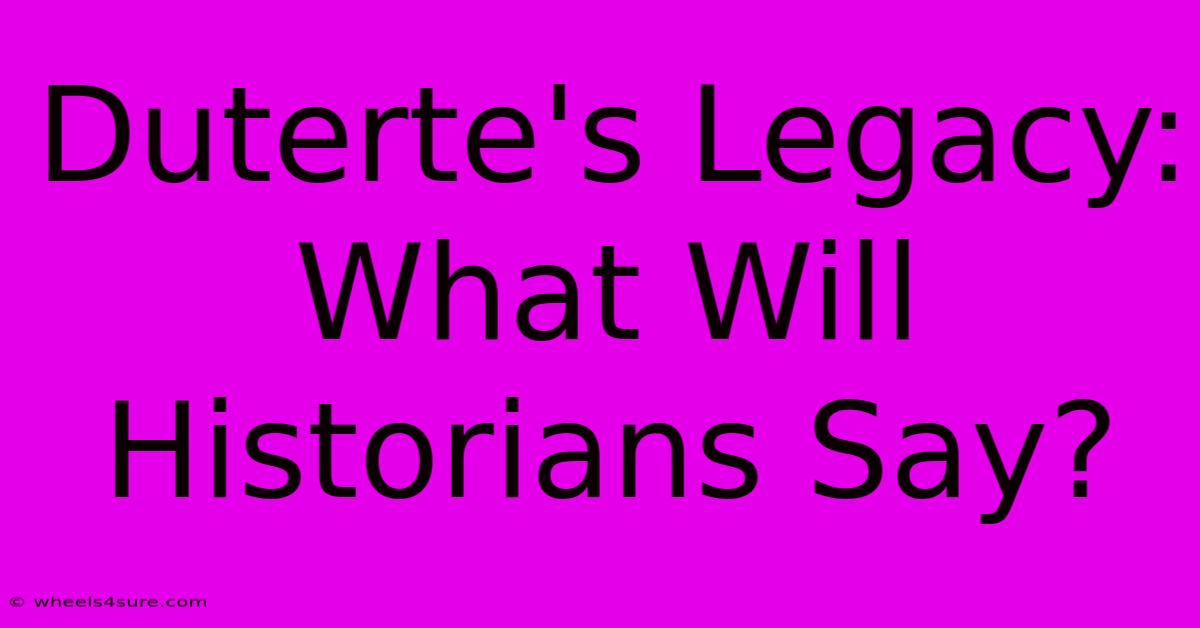Duterte's Legacy: What Will Historians Say?

Table of Contents
Duterte's Legacy: What Will Historians Say?
Rodrigo Duterte's presidency (2016-2022) was undeniably one of the most impactful and controversial in Philippine history. His six years in office were marked by a dramatic "war on drugs," significant infrastructure projects, and a complex foreign policy balancing act. But what will historians ultimately conclude about his legacy? This question is far from settled, and the answer will likely be multifaceted and debated for generations.
The War on Drugs: A Defining Feature
Duterte's "war on drugs" is arguably the most defining aspect of his presidency. The campaign, characterized by a high body count and controversial tactics, sparked international condemnation and ignited passionate debate within the Philippines. While supporters credit it with reducing crime rates in some areas, critics point to the thousands of extrajudicial killings and the human rights violations it entailed. Historians will have to grapple with the complex statistics, the varying accounts of witnesses and victims, and the ethical implications of such a brutal approach to law enforcement. The long-term social and economic consequences of this campaign will be crucial aspects of any historical assessment.
The Economic Impact: "Build, Build, Build"
The "Build, Build, Build" infrastructure program was another key initiative of the Duterte administration. This ambitious project aimed to modernize the country's infrastructure through the construction of roads, bridges, railways, and other crucial facilities. While some projects were completed and did yield positive economic effects, others faced delays, cost overruns, and questions regarding transparency. Historians will need to analyze the program's actual impact on the Philippine economy, its contribution to long-term development, and its overall cost-effectiveness. Was it a resounding success, a partial triumph, or ultimately a costly failure? This is a question that will require rigorous investigation.
Foreign Policy: Navigating Shifting Alliances
Duterte's foreign policy was marked by a pivot towards China and a more distant relationship with the United States, a traditional ally. This shift reflected a desire to pursue independent foreign policy, but it also raised concerns about the country's strategic alliances and its position in the regional geopolitical landscape. Historians will analyze the motivations behind this strategic recalibration, examining its impact on the Philippines' security and its economic relations with major global powers. The long-term consequences of this altered foreign policy balance remain to be seen.
Social and Political Reform: A Mixed Bag
Beyond the prominent policies mentioned above, Duterte's presidency also included social and political reforms, some met with success and others with criticism. These include efforts to improve healthcare, education, and agricultural production. However, concerns were raised regarding the erosion of democratic institutions, the suppression of dissent, and the increasing influence of authoritarian tendencies. Historians will need to objectively evaluate these reforms, weighing their positive contributions against their potential negative consequences for Philippine democracy.
The Unanswered Questions and the Historian's Task
The full impact of Duterte's presidency will only become clear over time. Historians will need to access a wide range of sources, including government documents, news reports, personal accounts, and sociological studies, to fully understand the complex legacy of this era. They will need to carefully analyze the data, contextualize events, and present a nuanced and balanced account, free from political bias. This task is not just about chronicling events but also about interpreting their significance and understanding their long-term impact on the Philippines and its place in the world.
Ultimately, the judgment of history on Rodrigo Duterte's presidency will be complex and multifaceted. It will require a careful examination of both successes and failures, considering the perspectives of diverse stakeholders and carefully weighing evidence to arrive at a well-supported conclusion. The legacy of his time in office will undoubtedly continue to be debated and re-evaluated for decades to come.

Thank you for visiting our website wich cover about Duterte's Legacy: What Will Historians Say?. We hope the information provided has been useful to you. Feel free to contact us if you have any questions or need further assistance. See you next time and dont miss to bookmark.
Featured Posts
-
Jurassic Age Dti Unleash Your Inner Dinosaur
Mar 28, 2025
-
Age Uk Gardening Made Easy For The Elderly
Mar 28, 2025
-
Xxxtentacion His Age And The Medias Portrayal
Mar 28, 2025
-
Latto Age A New Perspective
Mar 28, 2025
-
Kim Soo Hyun Age Still Looking Amazing
Mar 28, 2025
